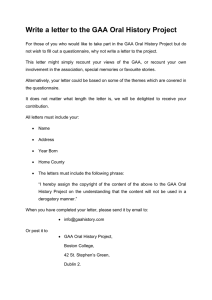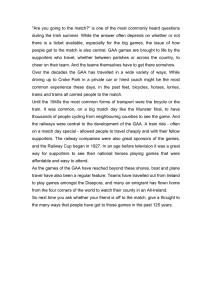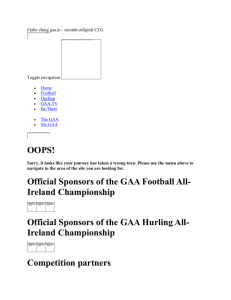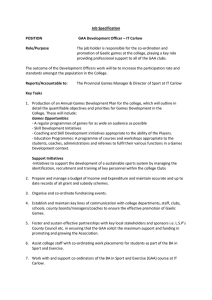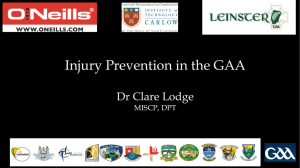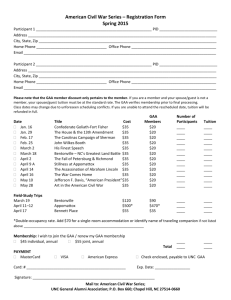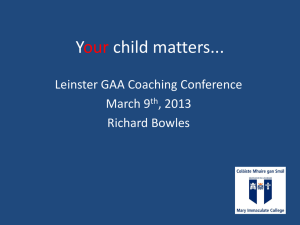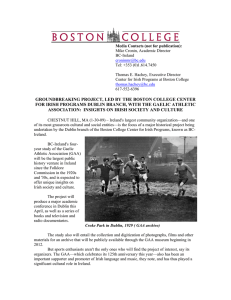Participating in the GAA Oral History Project:
advertisement
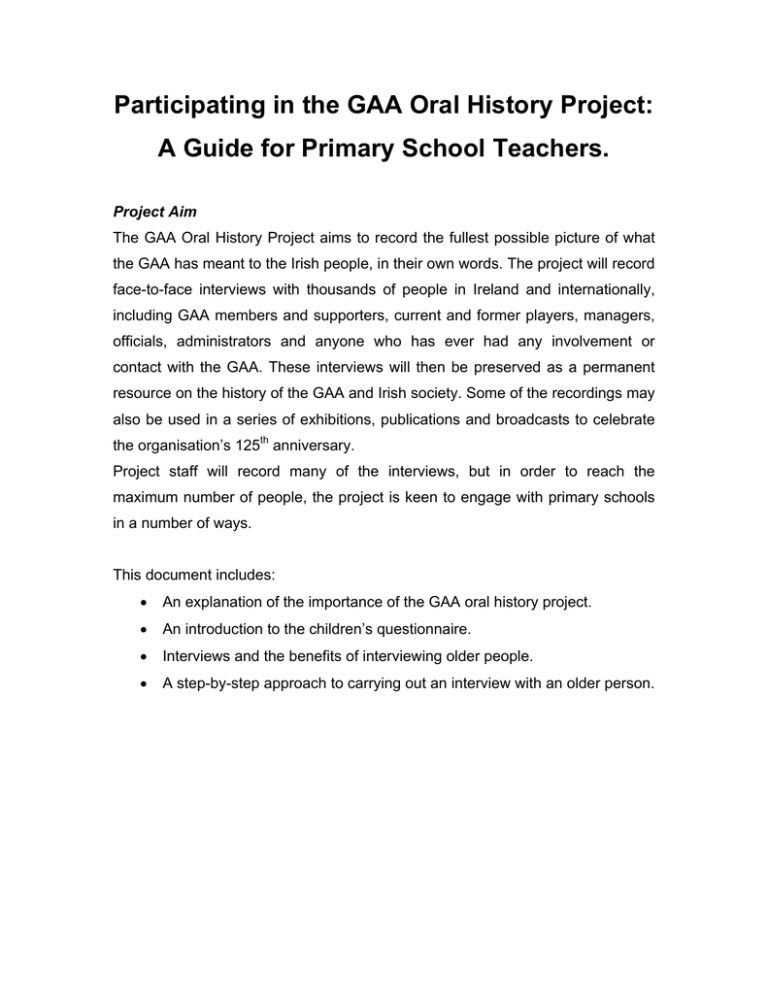
Participating in the GAA Oral History Project: A Guide for Primary School Teachers. Project Aim The GAA Oral History Project aims to record the fullest possible picture of what the GAA has meant to the Irish people, in their own words. The project will record face-to-face interviews with thousands of people in Ireland and internationally, including GAA members and supporters, current and former players, managers, officials, administrators and anyone who has ever had any involvement or contact with the GAA. These interviews will then be preserved as a permanent resource on the history of the GAA and Irish society. Some of the recordings may also be used in a series of exhibitions, publications and broadcasts to celebrate the organisation’s 125th anniversary. Project staff will record many of the interviews, but in order to reach the maximum number of people, the project is keen to engage with primary schools in a number of ways. This document includes: • An explanation of the importance of the GAA oral history project. • An introduction to the children’s questionnaire. • Interviews and the benefits of interviewing older people. • A step-by-step approach to carrying out an interview with an older person. The Importance of the GAA Oral History Project. It is important that the aims and methods of the GAA Oral History Project are understood. The project aims to record the thoughts and feelings of every section of the Irish population at home and abroad and at every age, towards the GAA. This is the largest public history project in Ireland since the Folklore Commission of the 1930s. Why an Oral History of the GAA? The history of the GAA is a people’s history. In an organisation of volunteers, the thoughts and stories of ordinary members and supporters should be recorded along with those of champions and presidents. We have alive in Ireland today a group of people who can tell us exactly what it was like to play hurling with Christy Ring, or cycle to Croke Park from Kerry for the All-Ireland Final. We need to preserve as many of those voices as we can. By recording the widest possible selection of interviews, we can create an unmatched resource for ourselves and for future generations of scholars and fans. The Children’s Questionnaire We are targeting as many schools as possible and asking them to take part in the project. The future of the GAA depends on today’s youth and we are committed in involving them in the project. A children’s questionnaire has been designed to allow young children to voice their opinions about the GAA. There are twelve questions in total, with five specific questions relating to the association. Children are asked to answer such questions as “What does the GAA mean to you?” and “What is your favourite GAA memory?” You might notice that we have also included some non-GAA related questions; these additional questions will help situate the place of the GAA within Irish contemporary culture and provide a rich source of information on the pastimes and opinions of Irish children today for the researchers of the future. As we are attempting to ascertain the views of children in Ireland today towards the GAA we would ask that you allow the children to complete the questionnaires without prompting. Having said that we would be very grateful if you could ensure the children write only their first names on the questionnaires and that they differentiate between Gaelic football and soccer when answering the ‘What sports do you play?” question. The Primary Geography Curriculum places an emphasis on “A Sense of Place and Space” and also “Living in the Community”. We believe that the children’s questionnaire is a valuable resource to this strand. It allows children to discuss the role of the GAA and the club in the child’s community and personal life. What happens to the children’s contribution? The questionnaires, and the interviews which are discussed below, will be preserved as part of the GAA Oral History Archive and will be made accessible to the public. This material may be used in the following ways: • Use in schools, universities, colleges and other educational establishments, including use in a thesis, dissertation or similar research • Public performance, lecture of talks • Use in publications, including print, audio or video cassettes or CDROM • Public reference purposes in libraries, museums and archives • Use on radio or television • Publication worldwide on the internet Please note: It is imperative that you ask your students to bring home their questionnaire sheets and have them signed by a parent/guardian. A box has been provided at the end of page two for this signature, which also contains contact details for the project, should the parent/guardian have any questions. We will be unable to include any questionnaire returned without this signature in the GAA Oral History Archive. Your help in this matter is greatly appreciated. Interviews and the benefits of Interviewing an Older Person Interviewing an older person can be a very rewarding experience for children. Children can benefit greatly by listening to, telling and retelling stories, it is a natural part of every child’s development and a fundamental part of history. We have provided a sample of questions for children to ask an older relative. These questions are in no way exhaustive and teachers are encouraged to adapt them to the needs of their class. Again, it is imperative that the older relation signs the end of the questionnaire as otherwise it will not be possible to include the child’s submission as part of the archive. A step-by-step approach to carrying out an interview in the classroom is outlined below. Step-by-step Approach to Carrying out an Interview in the Classroom ***Please Note: If you wish to have this exercise included as part of your submission to the GAA Oral History Project you will need to contact the project in advance as there is additional paperwork to be completed*** Step 1: Choosing and preparing interviewees Interviewees need to be selected with care if they are to prove an effective source of oral history for primary school situations. A number of issues need to be considered when selecting interviewees, these include the following: • The ability of the person to talk about the past while taking into account the interests, vocabulary and limited attention span of children. • The willingness of the person to talk about his/her personal circumstances, family, and experiences. Some of the questions asked by children may evoke, quite unintentionally, memories of an intensely personal nature. Potential interviewees may be selected in a number of ways, e.g. amongst parents and grandparents of pupils or amongst parish, community groups and the local GAA club. Teachers should make contact with the interviewee in advance to describe the project, the age group of the pupils and to request permission to record the interview. Step 2: Preparing for the visit Some children may not find it easy to ask questions spontaneously, and if the interview is to prove worthwhile, pupils must be well prepared. This may involve knowing the personal background of the guest speaker or the background of the period about which they will speak. Children will need to be focused on what they should ask the visitor and have some basic interview techniques and so preparatory class work might include formulating questions. Groups in the class could be allotted a particular aspect of the interview and asked to prepare suitable questions. Some of these questions could then be tried out in role-play situations in the classroom. The aim of this is not only to encourage children to think about a range of questions in advance but also to examine the quality of the questions. The importance of listening carefully to what is being said should also be stressed. Children might write down some key questions, but they should be encouraged not to adhere rigidly to the list of questions. By listening carefully they should be able to respond to the speaker and elicit further interesting details. Step 3: The Interview Many of the interviews will take place in the classroom when the whole class meets the visitor. This is particularly suited to younger children. Older children may find it more beneficial to divide into smaller groups and interview the visitor. In all cases, children should learn to treat the visitor with courtesy and respect before, during and after the session. They should be encouraged to have a comfortable seat for the visitor, to listen politely, to offer to show the visitor some of the work and a letter of thanks should always be written by the children. Step 4: Follow-up The children should be encouraged to discuss the interview and do some followup activities to ensure that they are able to recall what they have heard and to clarify any issues that may have arisen. Conclusion: We believe that the activities mentioned above will encourage a variety of approaches, covering a range of concepts and skills, including research, observation and empathy. We would welcome any feedback about the activities and the resources. We hope that your school will take part in the project and that it will become an established part of your school’s curriculum. All submissions should be sent to: Ann-Marie Smith, GAA Oral History Project, Boston College, 42 St. Stephen’s Green, Dublin 2. Telephone: +353 (0)1 662 5055 E-mail: smith@gaahistory.com
